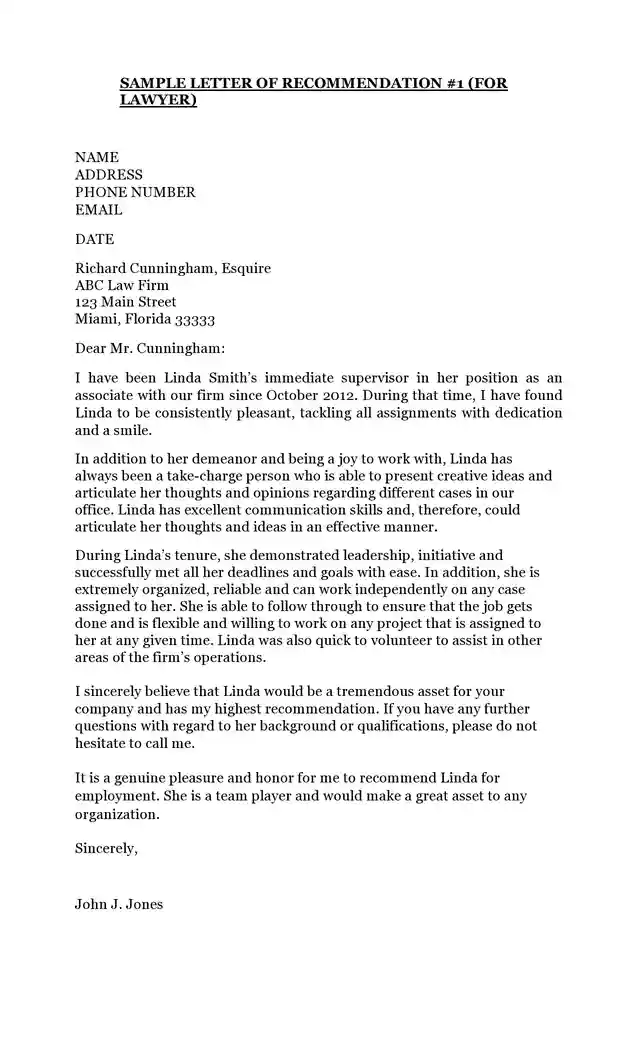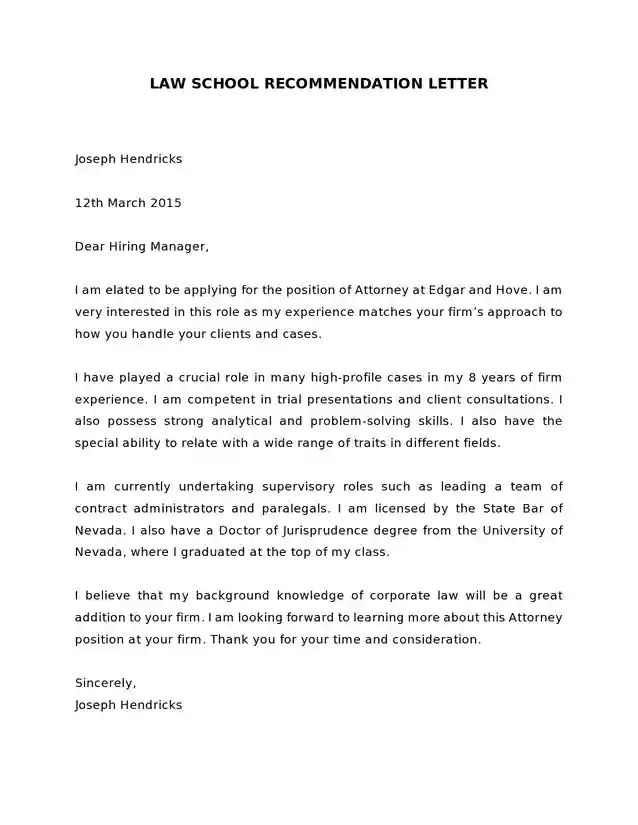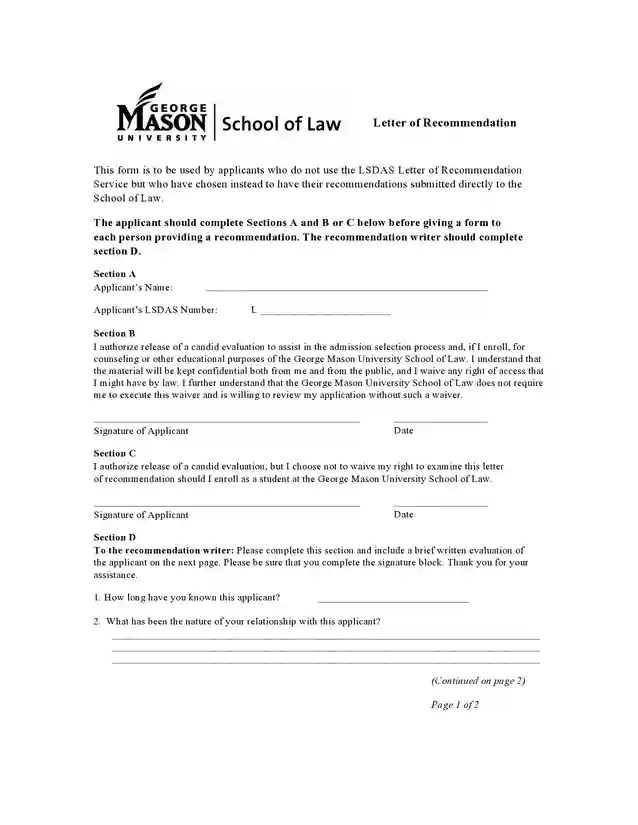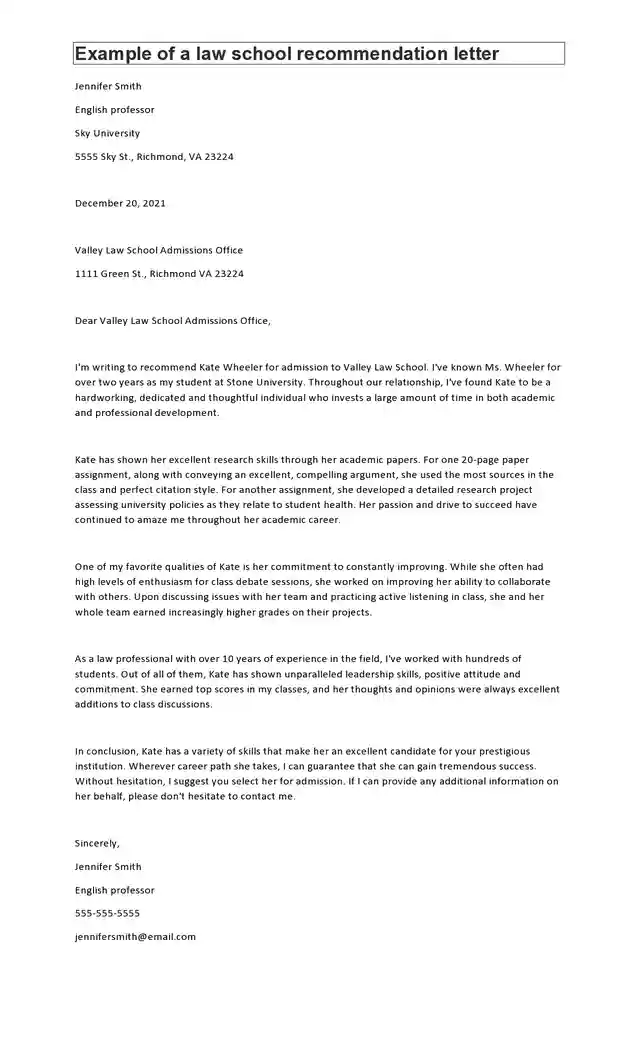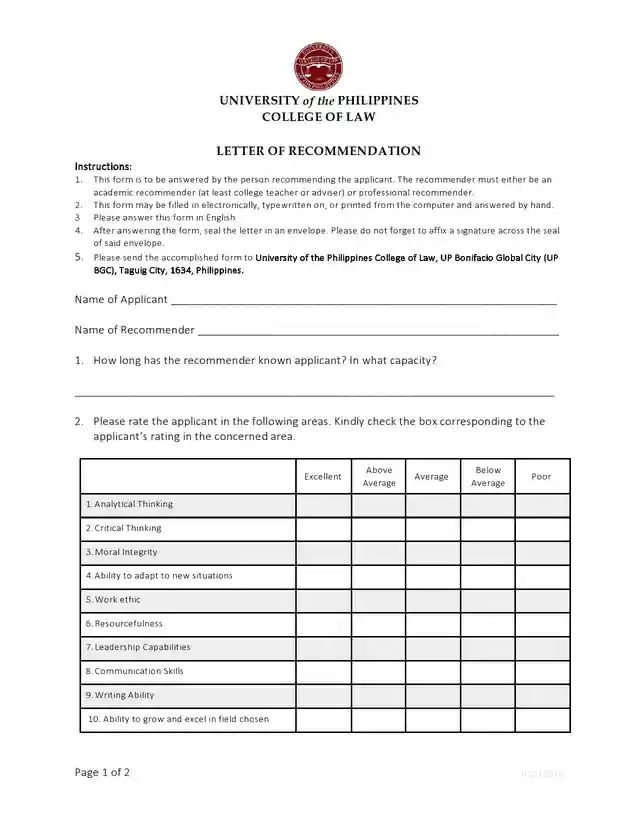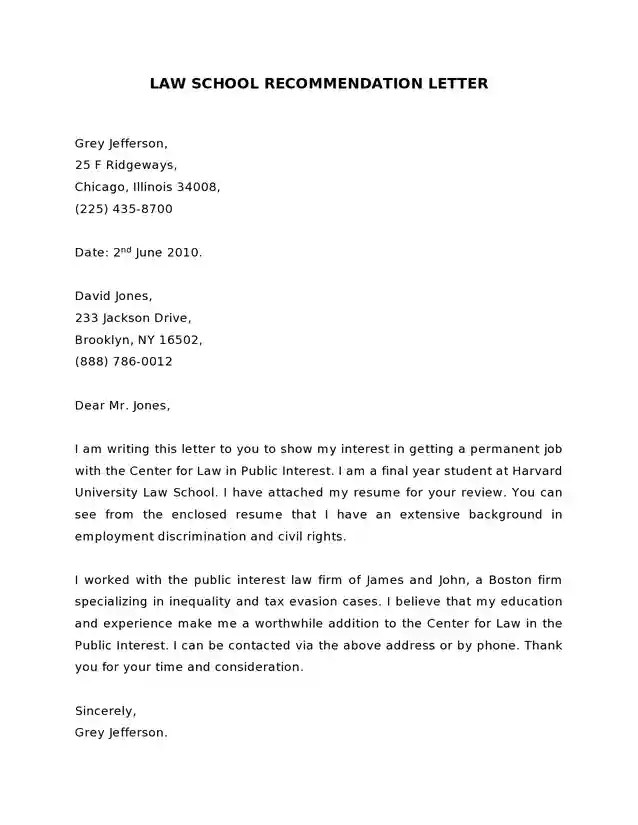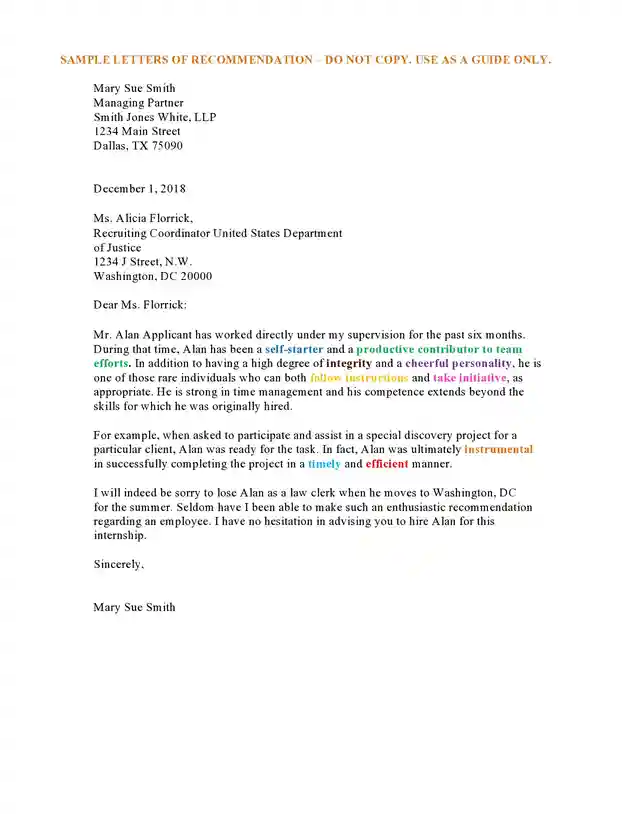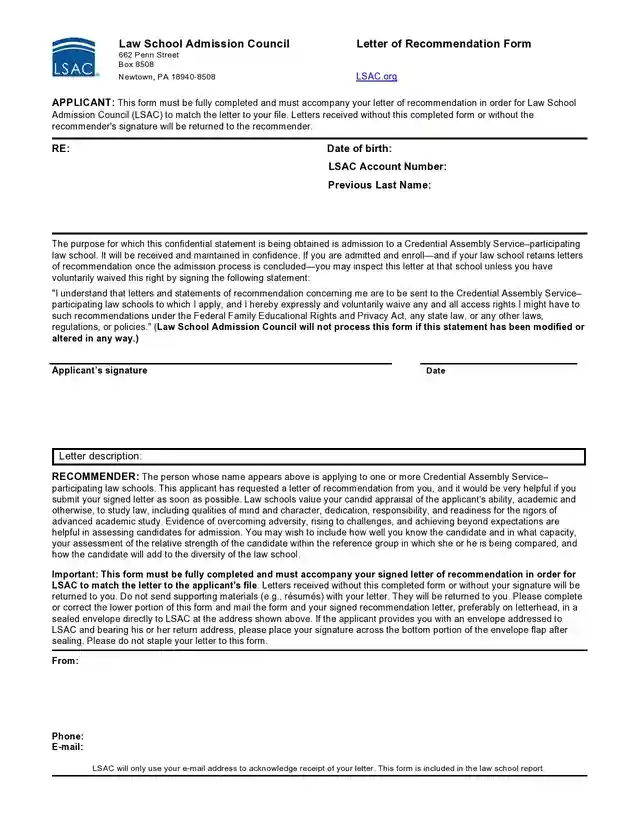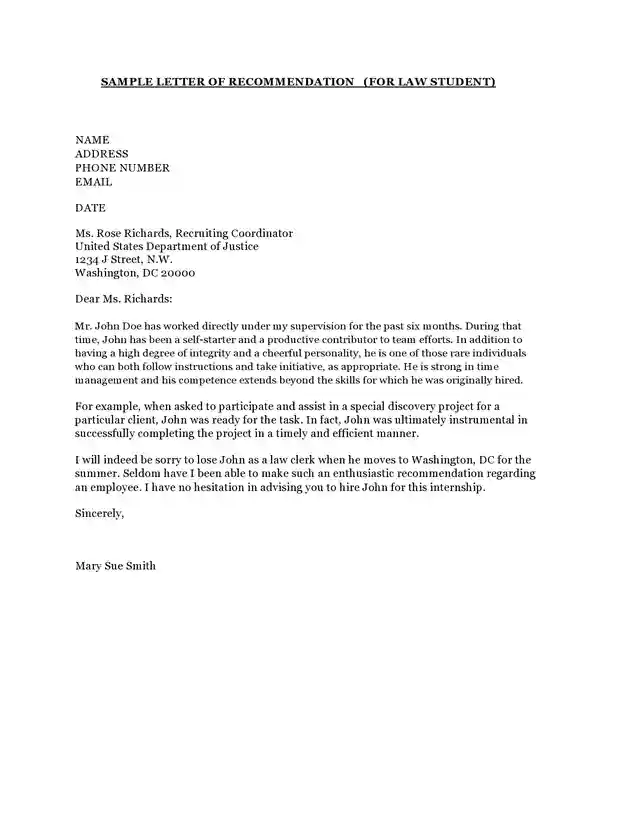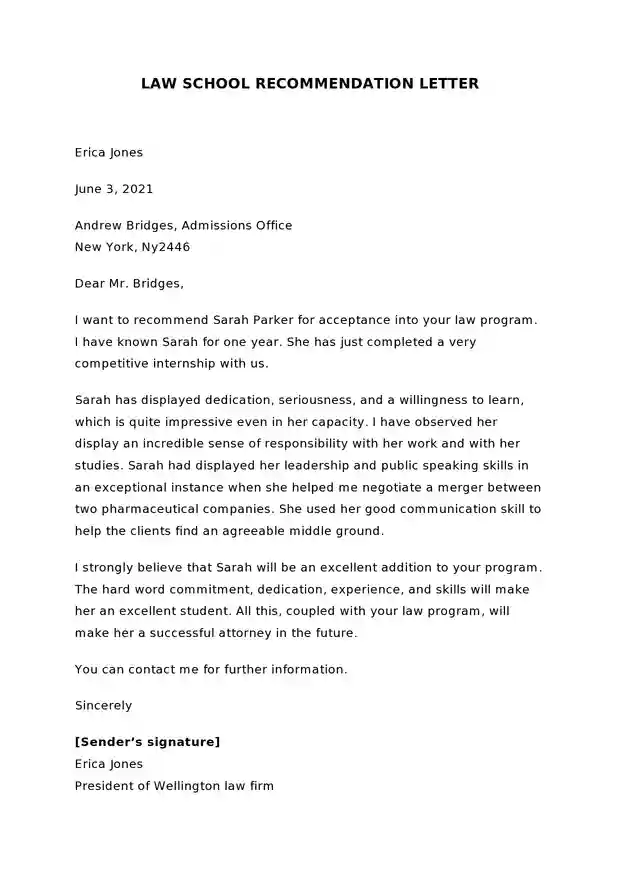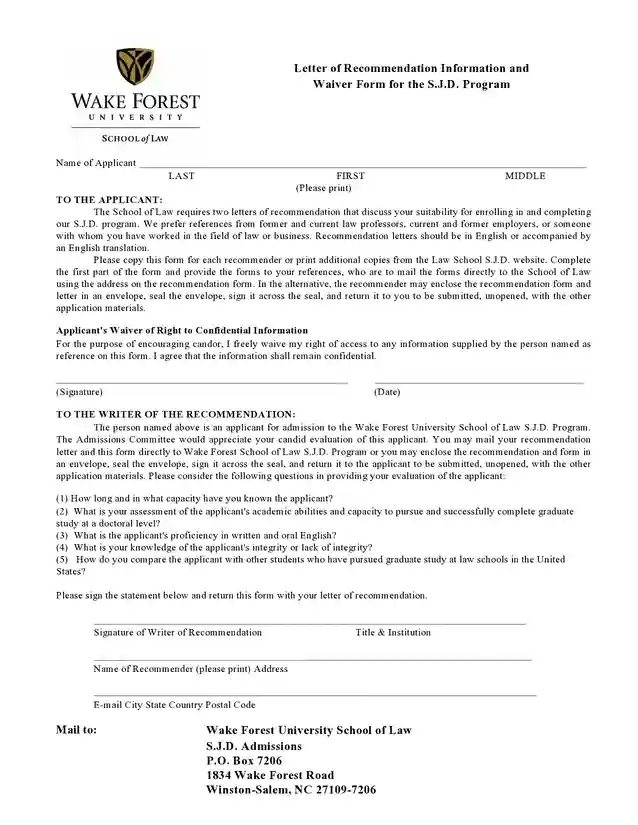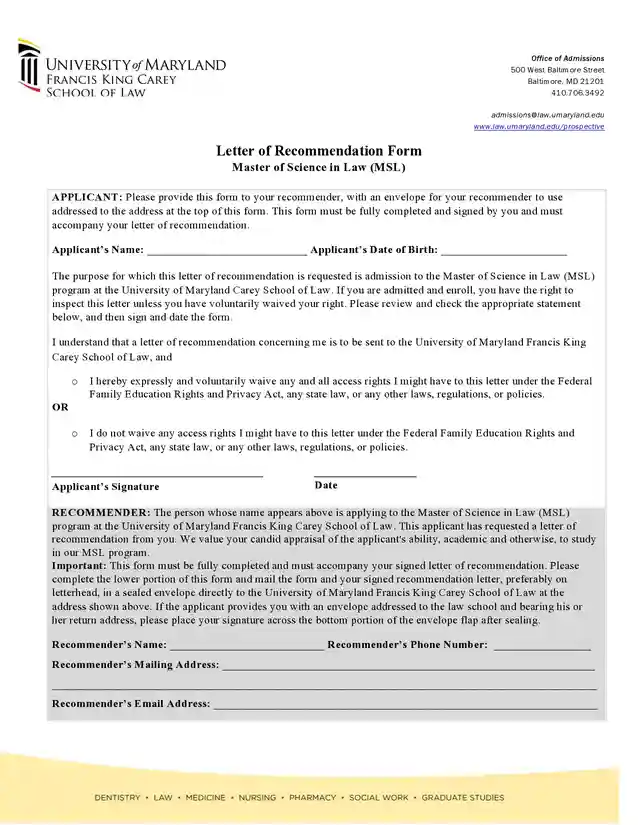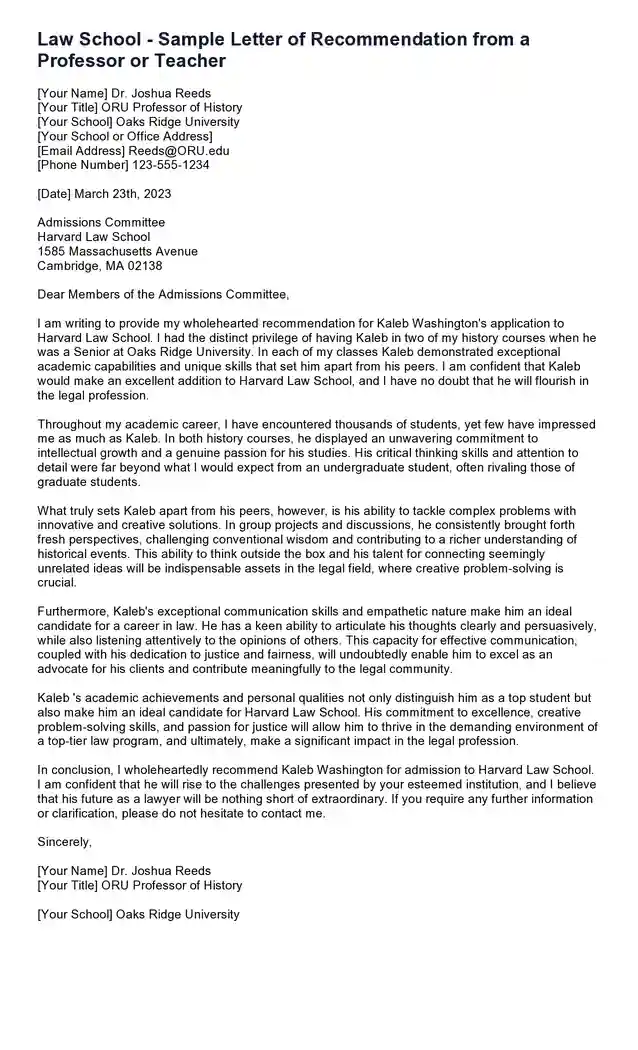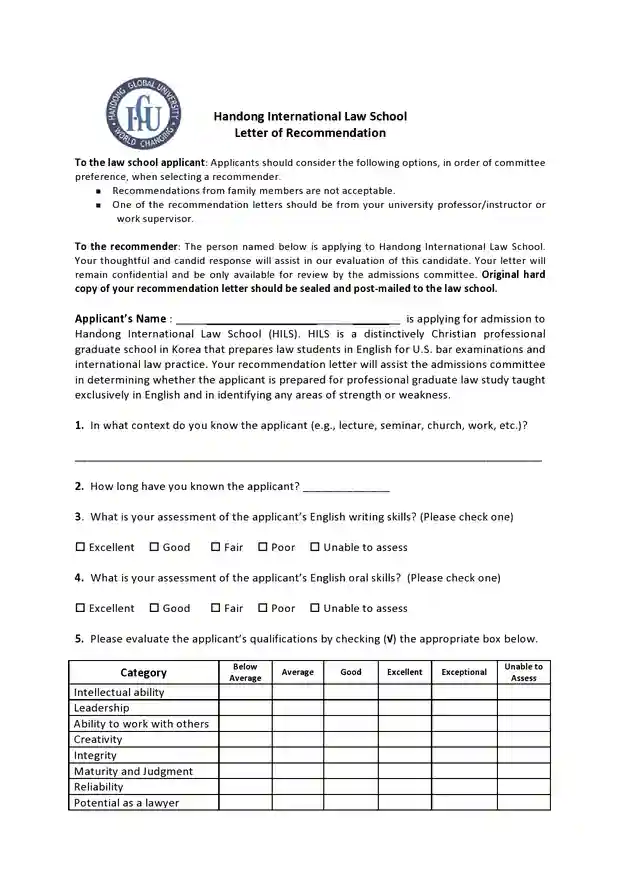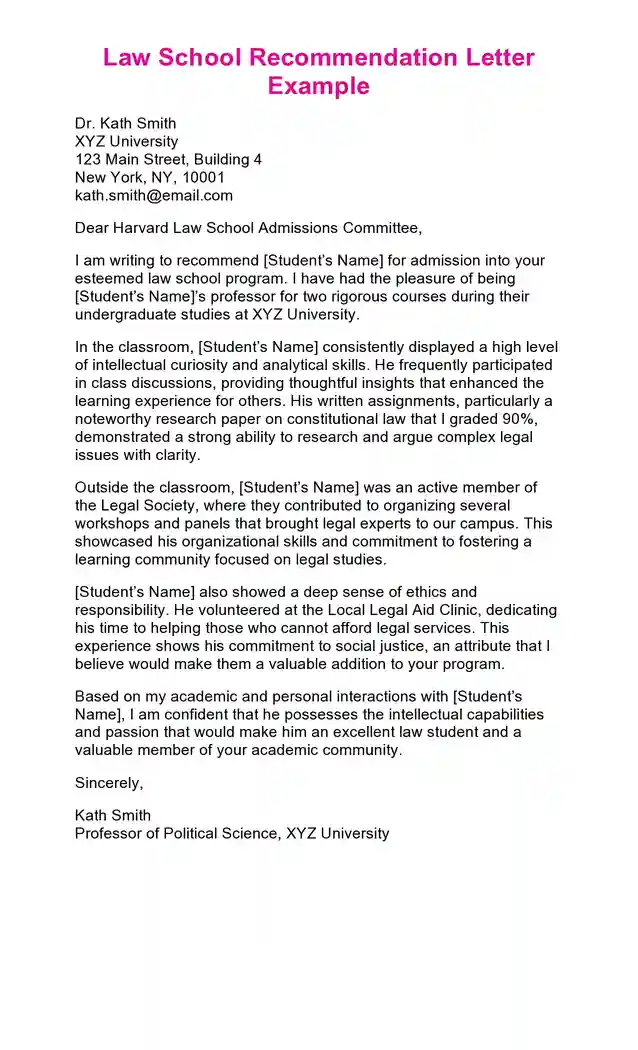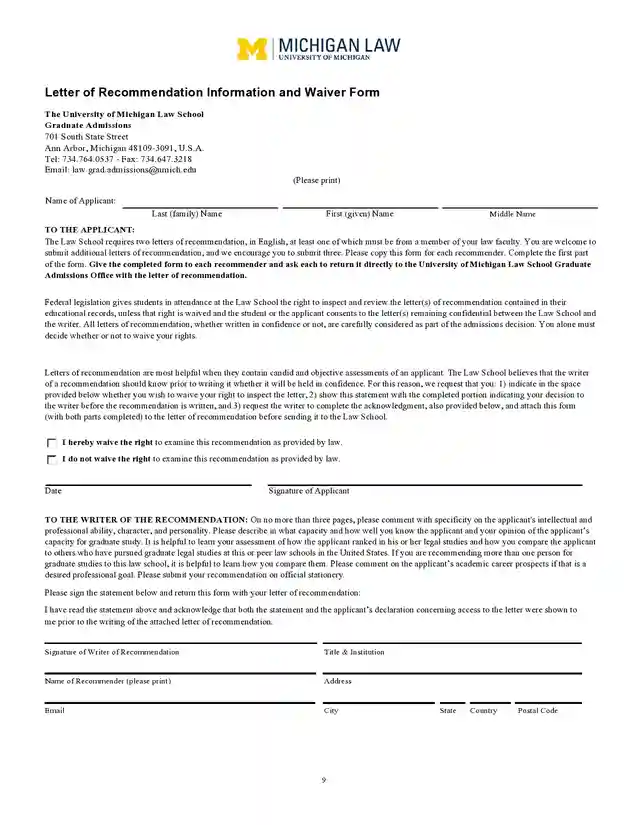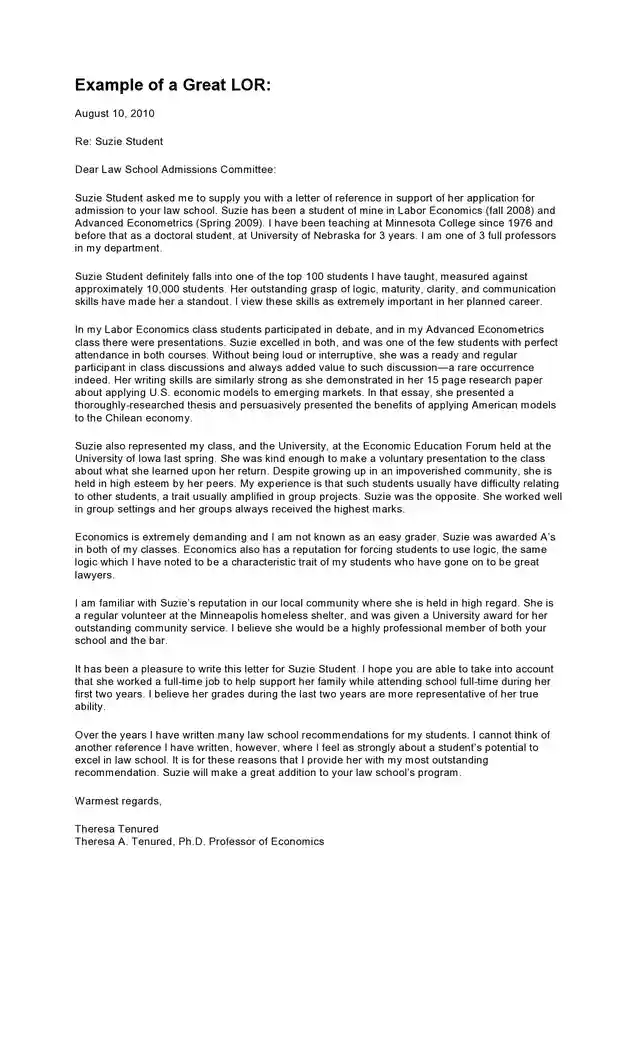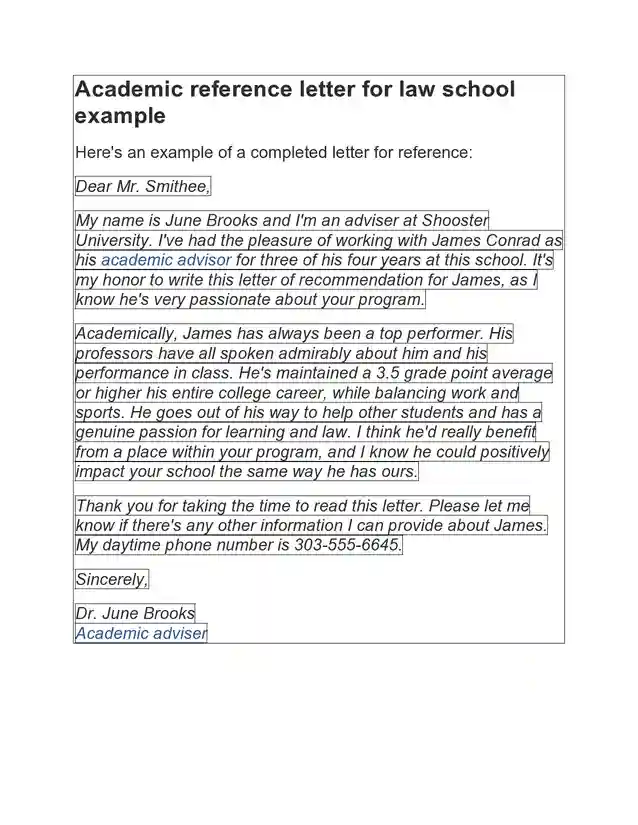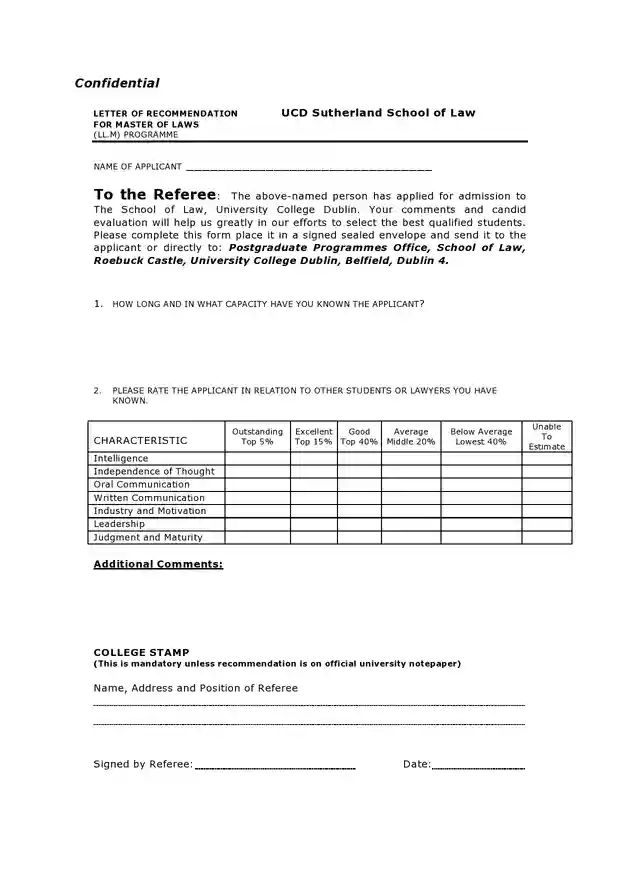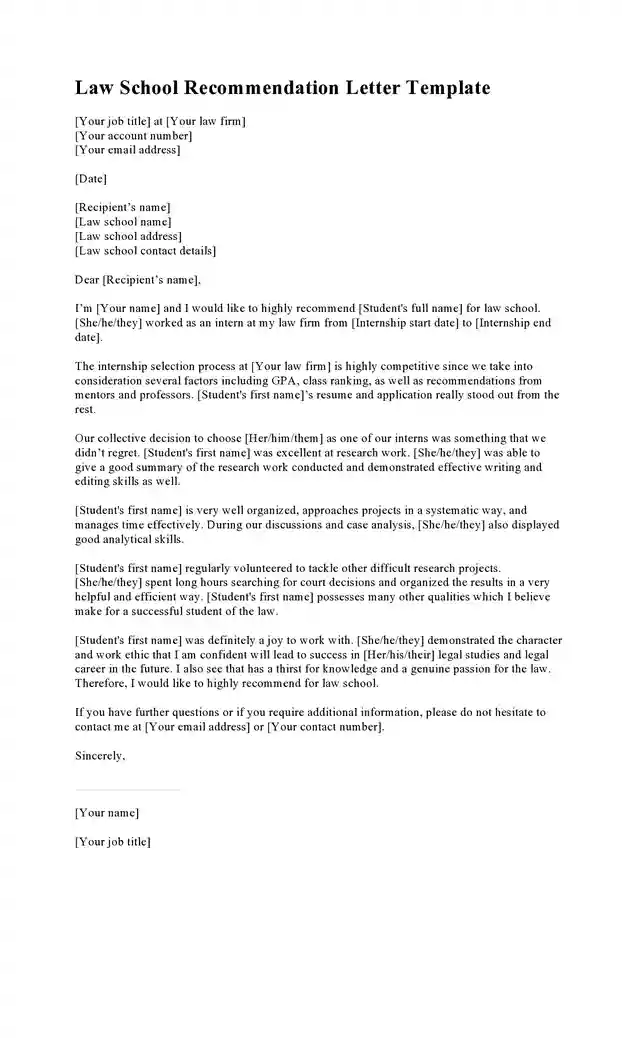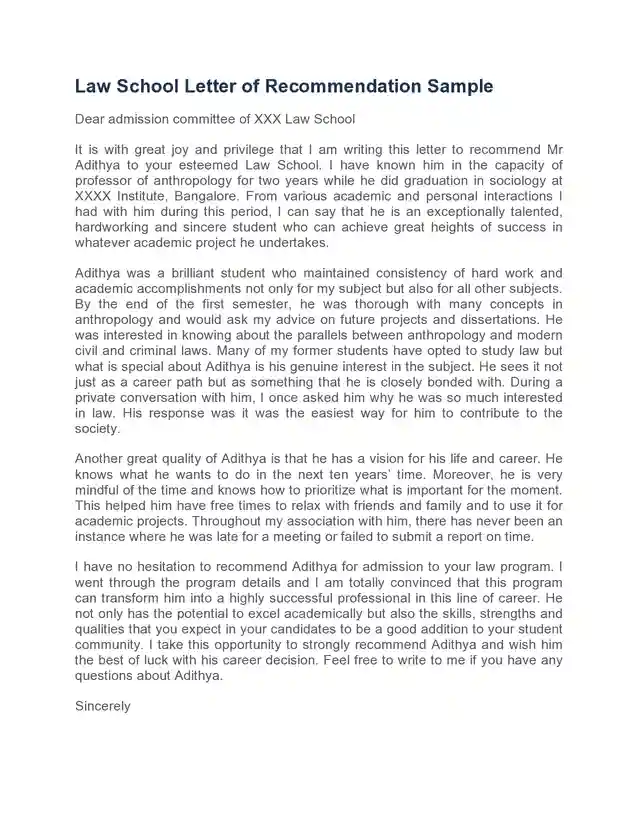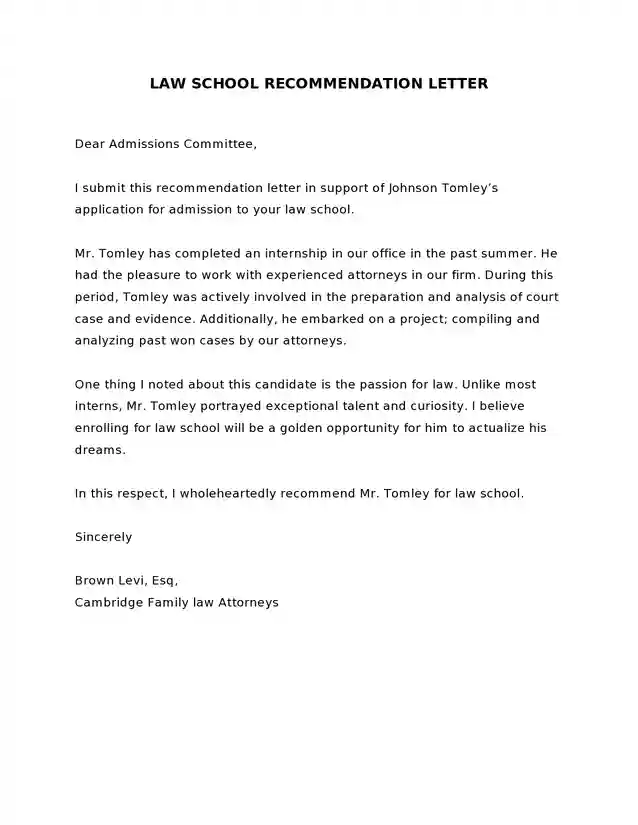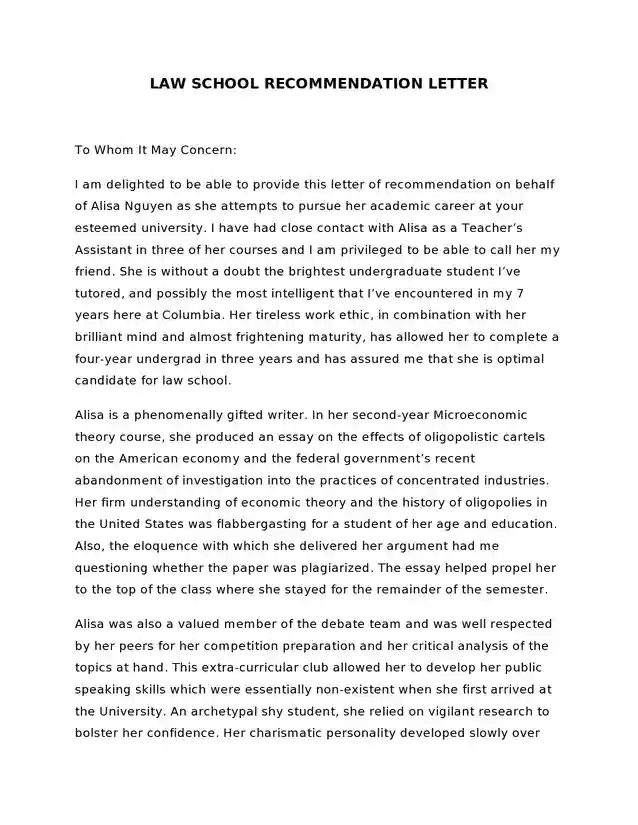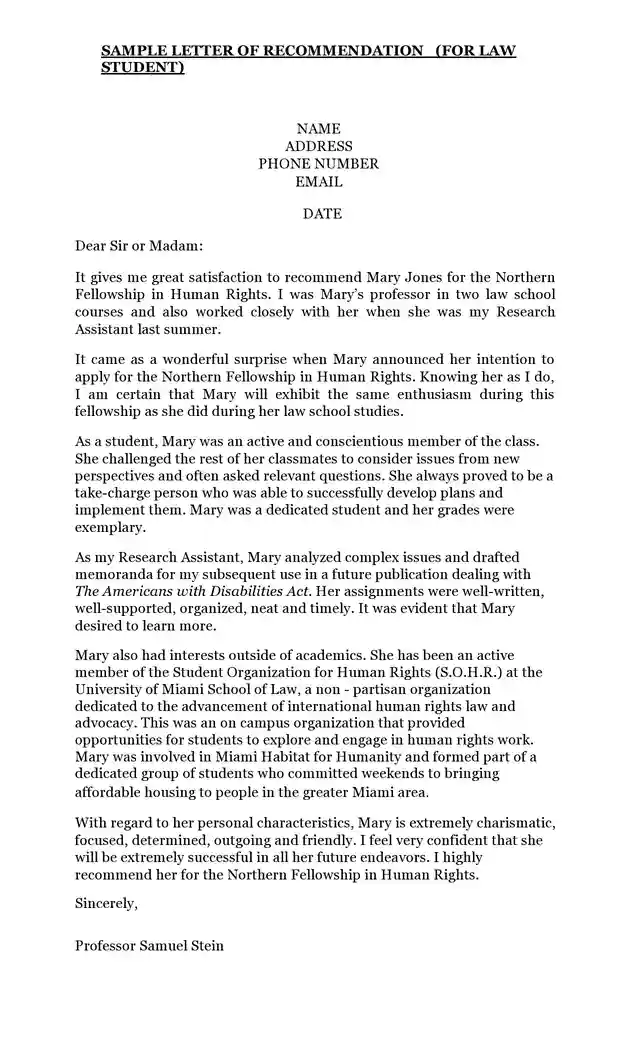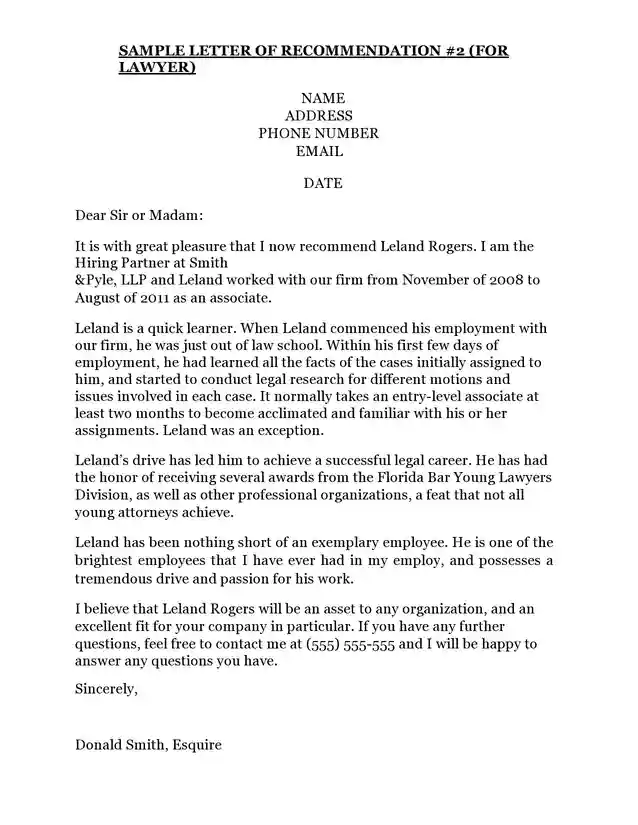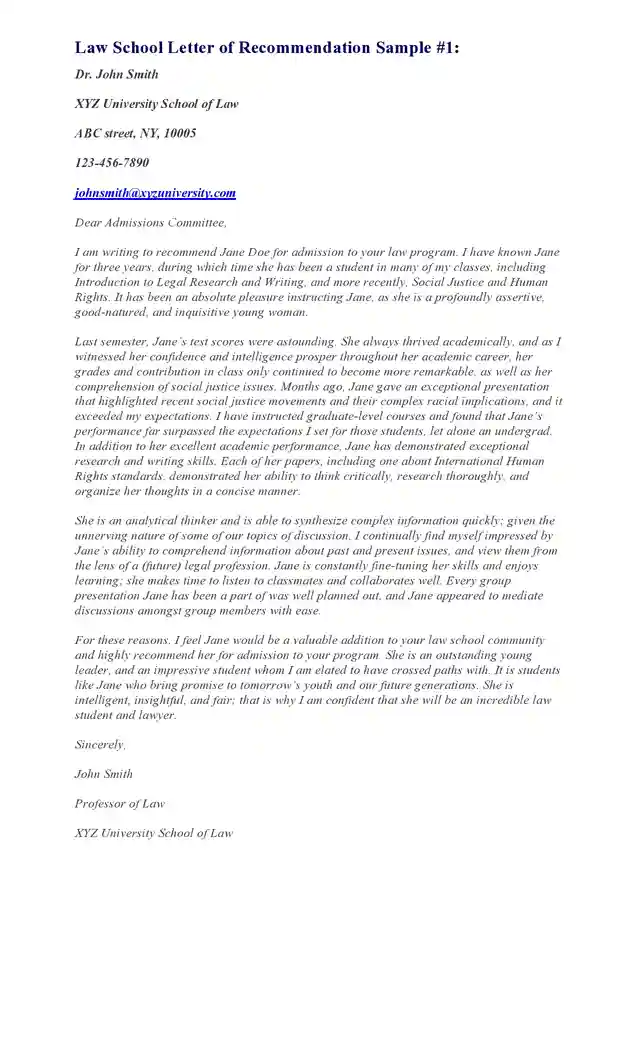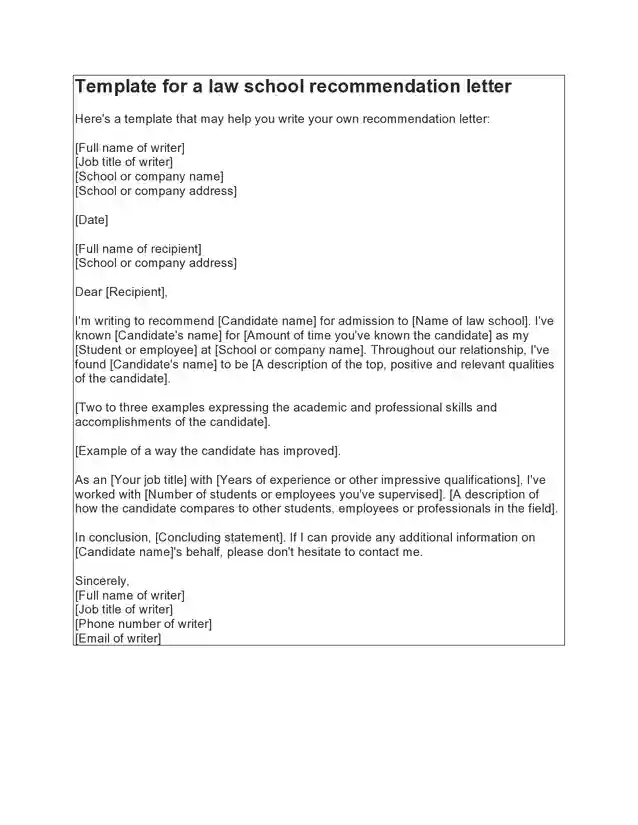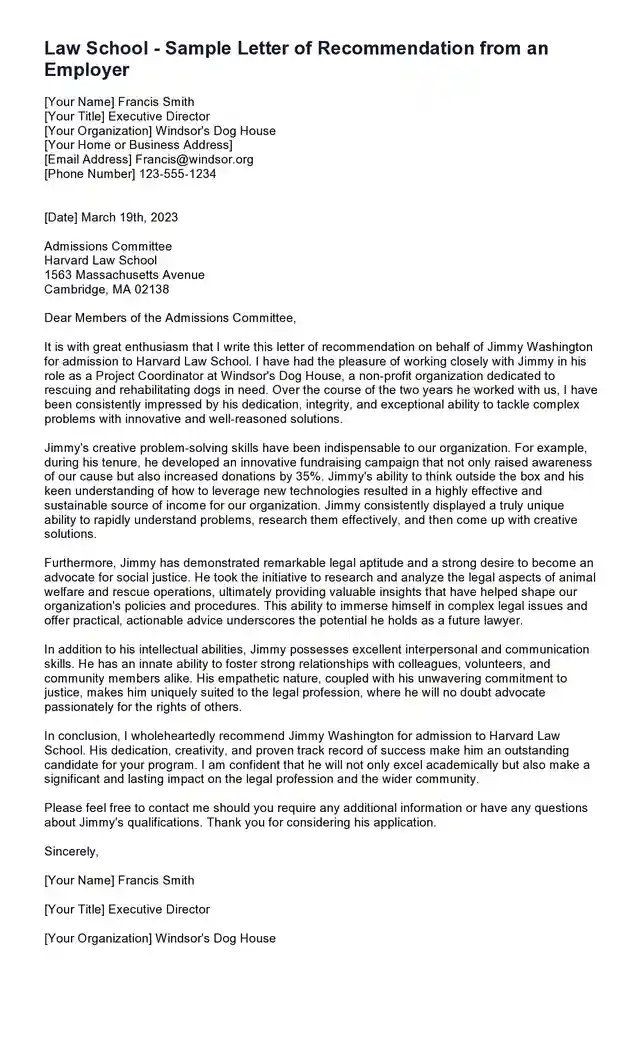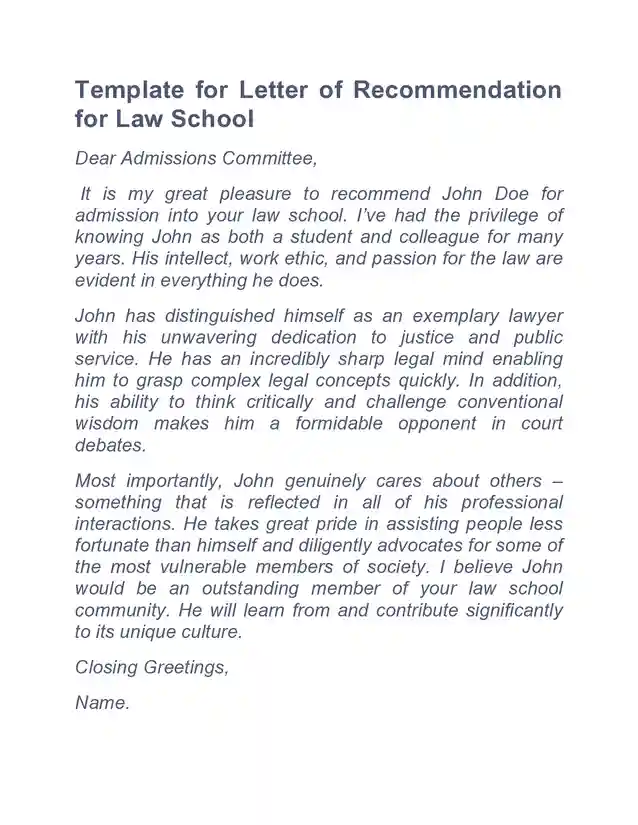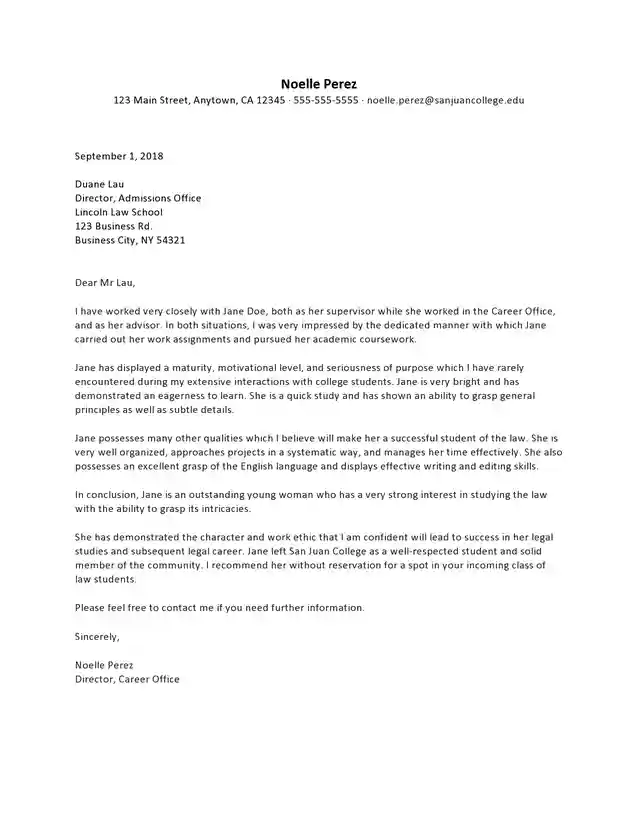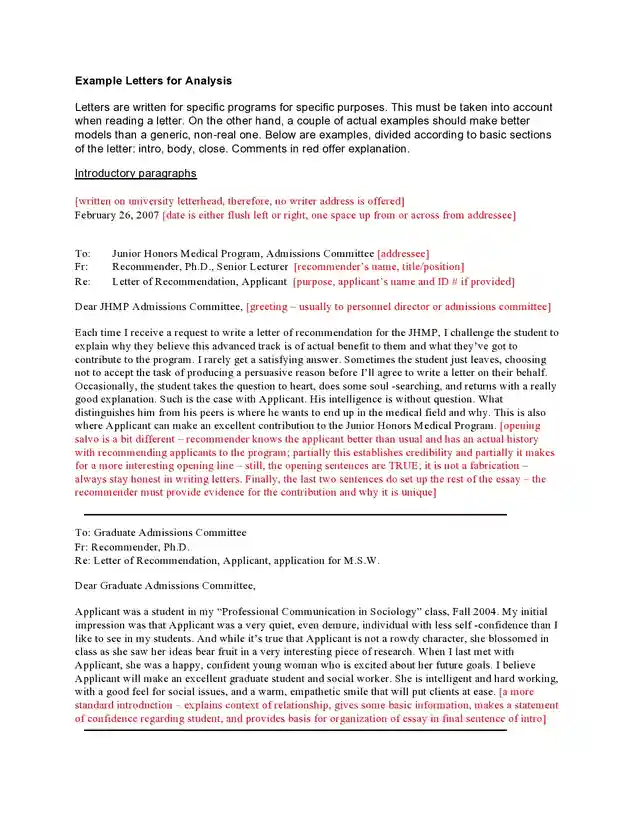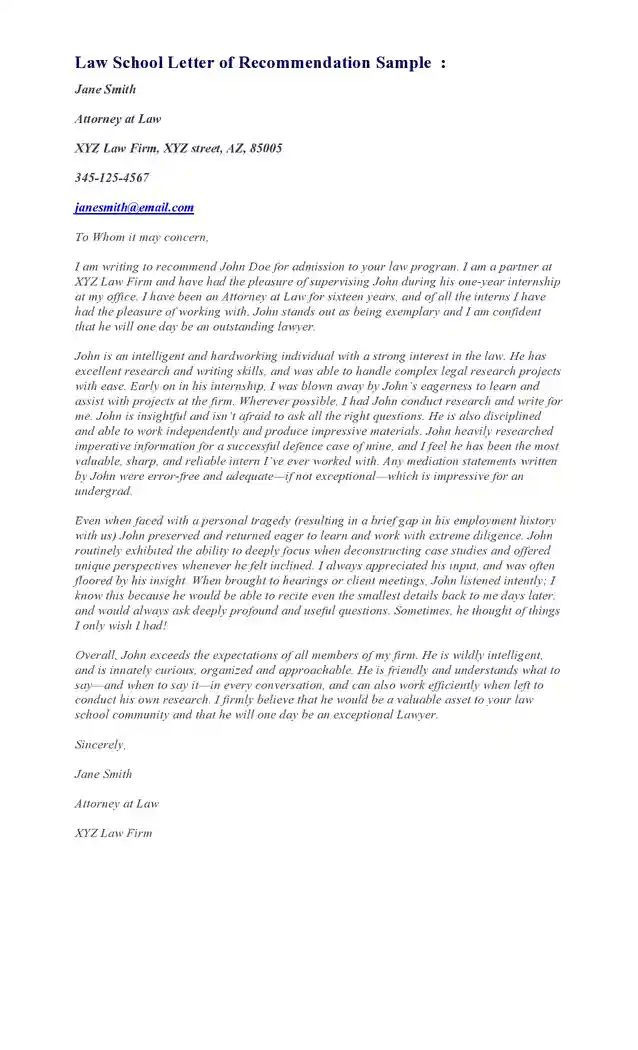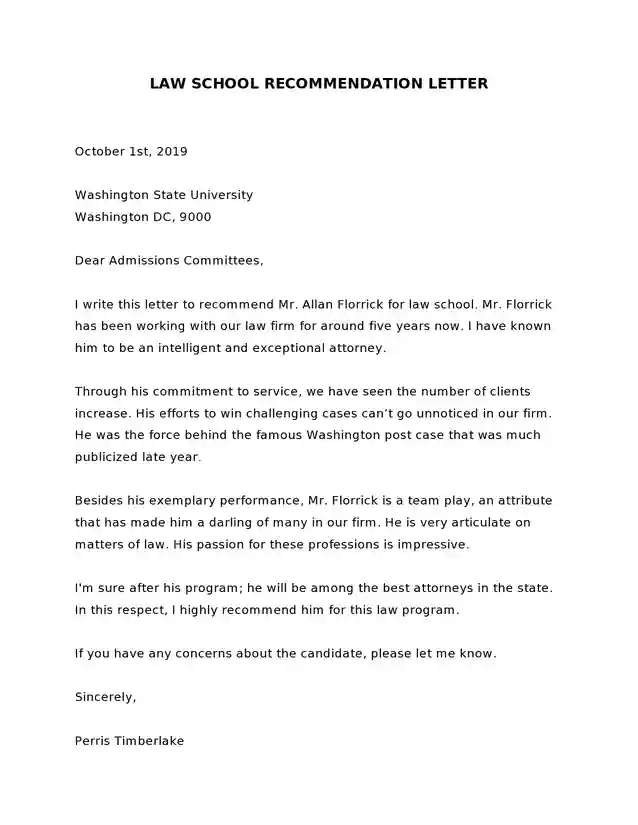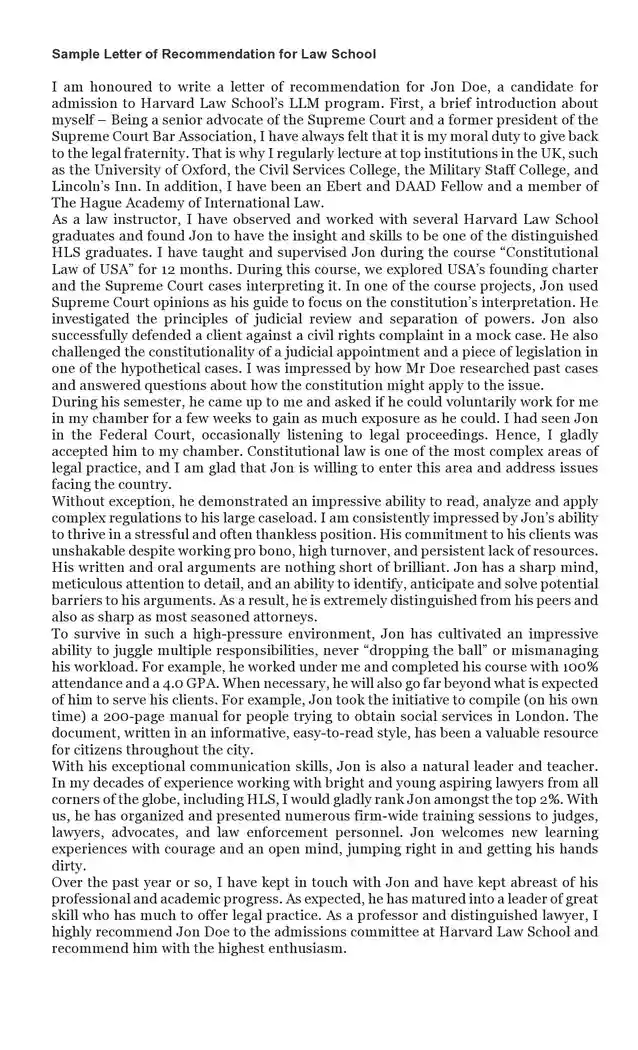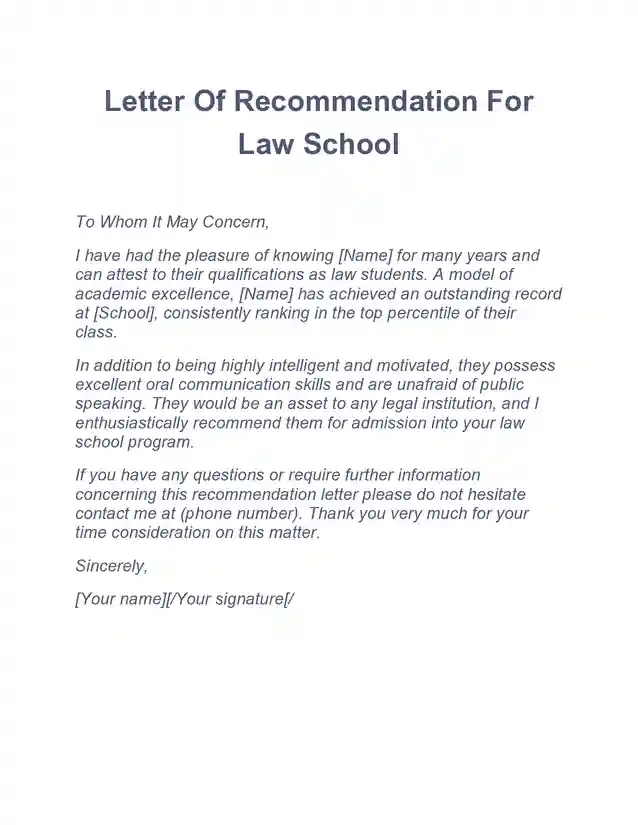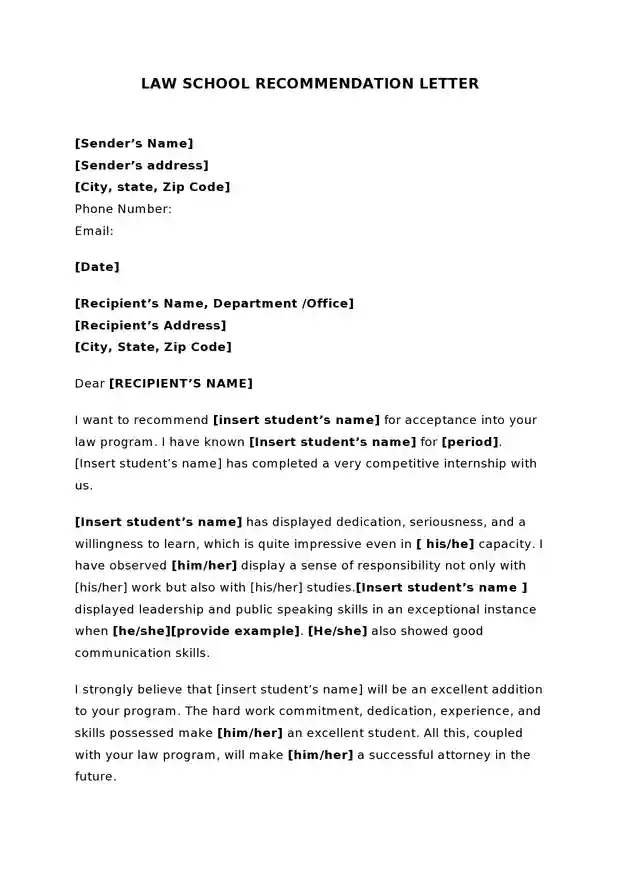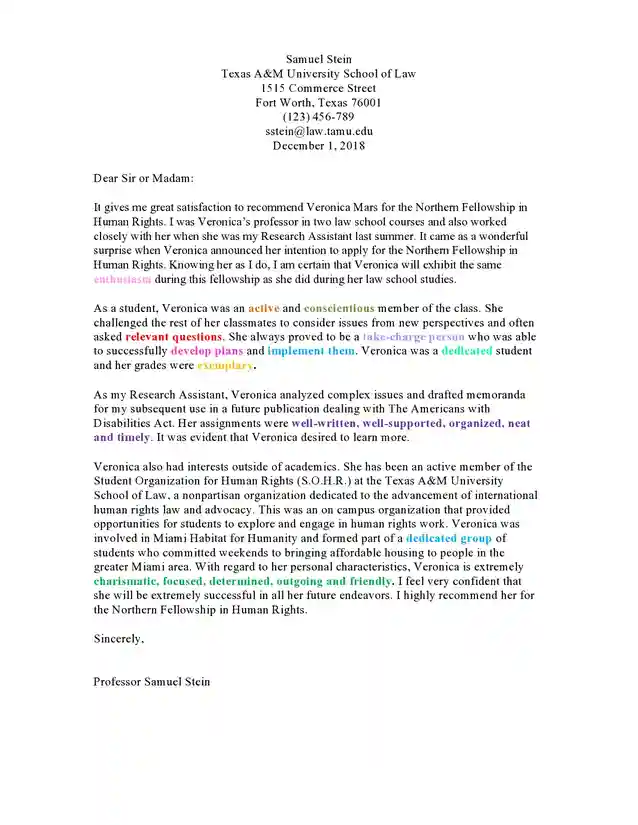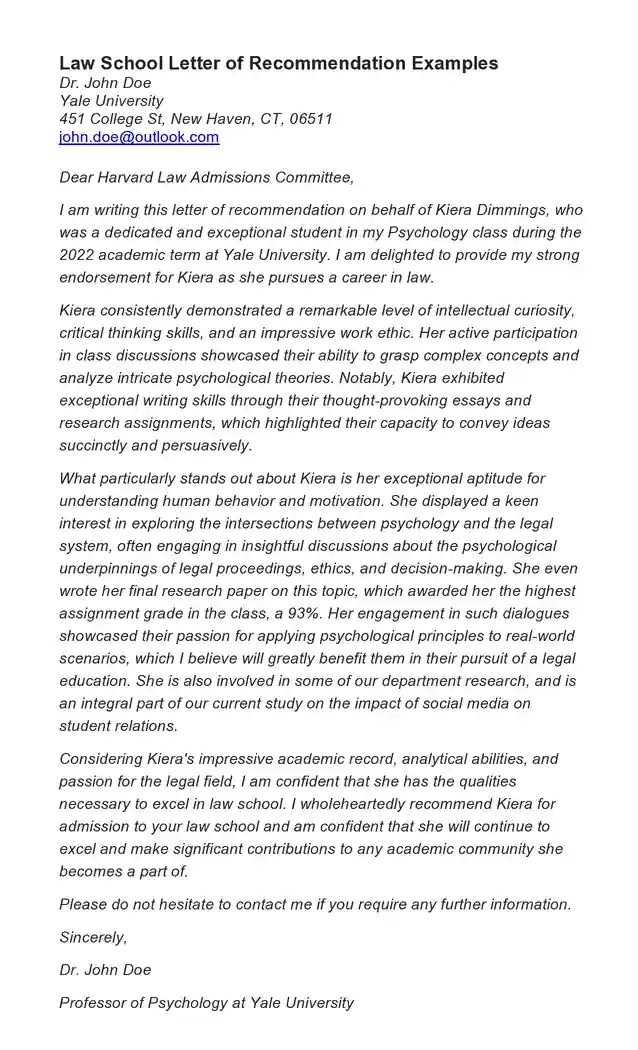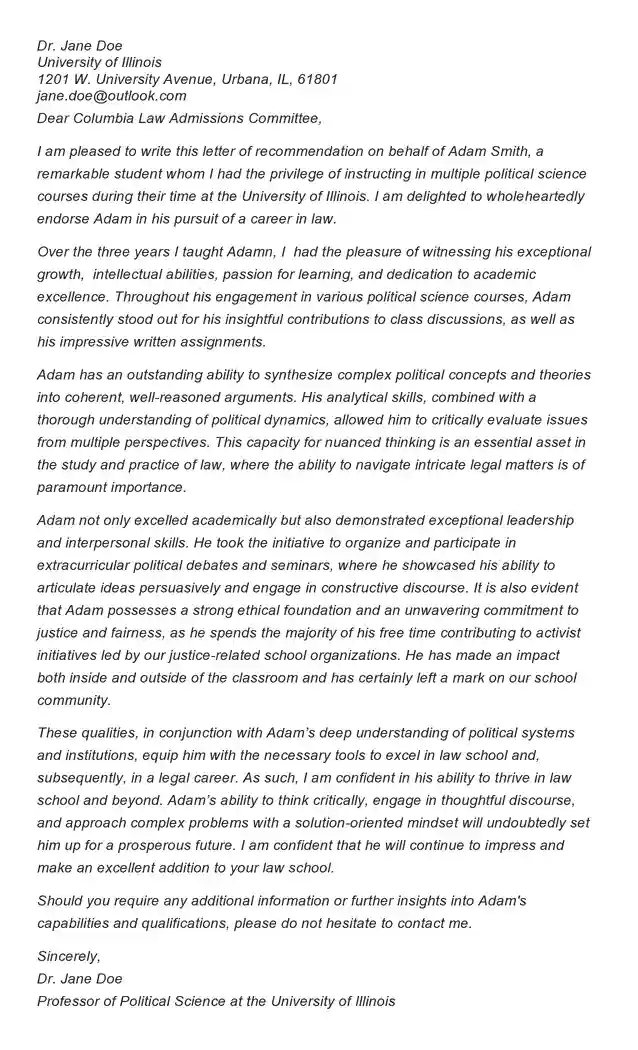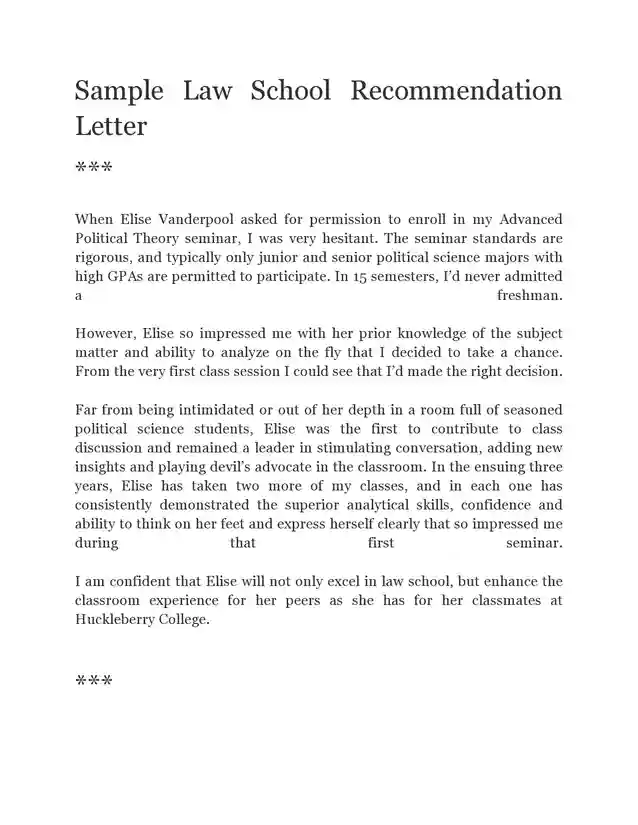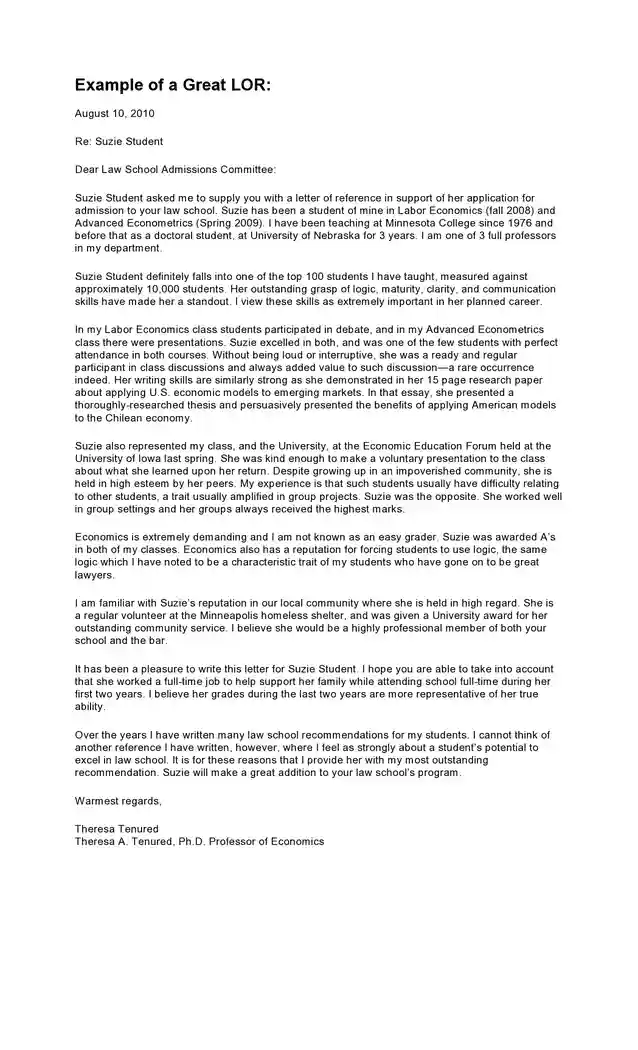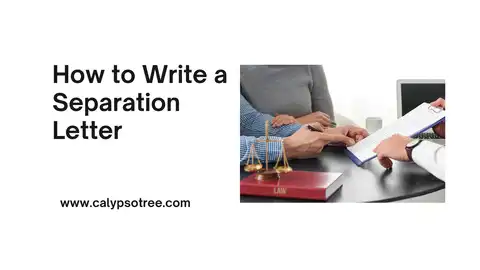A law school letter of recommendation example is very important. It helps your application stand out. This article will guide you on how to get a great letter of recommendation. We will share tips, explain who can write your letter, and provide an example to make the process easier.
What is a Law School Letter of Recommendation?
It is a letter that supports your application. It talks about your skills, character, and achievements. Law schools use it to understand you better.
Why it’s Important
Here’s why:
- Shows Your Strengths: A good letter will highlight your best qualities. It will talk about your skills, achievements, and character.
- Adds Personal Touch: It gives a personal view of you that grades and test scores can’t show. This helps the admissions committee get to know you better.
- Builds Credibility: A strong letter from a respected person, like a professor or employer, can make your application more credible. It shows that people who know you well believe in your abilities.
What Should Be Included?
A good law school letter of recommendation should have important details about you. Here’s what it needs:
Personal Anecdotes
These are stories that show your strengths and achievements. For example, a teacher might tell a story about how you helped lead a group project to success.
Achievements
This part talks about what you have accomplished in school or work. It could include awards you have won or special projects you have completed.
Character Assessment
This is where the writer talks about your character. They might describe how you interact with others and your positive traits, like being responsible and hardworking.
What Makes a Strong Letter?
Here’s what makes a letter strong:
Specific Examples
Use real-life examples to show the person’s skills and achievements. For instance, mention a project they did well or how they handled a tough situation.
Clear Strengths
Highlight the person’s best qualities. Explain why these qualities are important for law school. For example, talk about their problem-solving skills or dedication.
Personal Touch
The letter should sound personal and genuine. It should show that the recommender knows the person well and truly believes in their abilities.
A strong letter is:
- Honest and positive.
- Detailed but easy to read.
- Focused on the person’s readiness for law school.
When Should I Ask for a Letter?
It’s important to ask for a letter early. Here’s what you should do:
- Ask Early: Ask at least a month before you need the letter. This gives your recommender enough time to write a good letter without feeling rushed.
- Plan Ahead: Make a list of who you want to ask and reach out to them early.
- Provide Information: Give your recommender all the details they need. This includes your resume, the deadline, and any specific points you want them to mention.
Who Can Write The Letter?
Here are some people who can write it:
- Professors: They know your schoolwork and can talk about your skills in class.
- Employers: They can discuss your work ethic, responsibility, and achievements at your job.
- Mentors: They understand your character and can share personal stories about your growth.
Tips for Writing
These tips can help:
- Be Specific: Use specific examples to show the applicant’s strengths. For example, mention a project they did well or how they handled a tough situation.
- Stay Positive: Focus on positive traits and accomplishments. Avoid negative or vague statements.
- Be Concise: Keep the letter clear and to the point. It should be one to two pages long.
- Use a Professional Tone: Write in a professional and respectful tone. Make sure the letter is well-organized and free of errors.
- Include Contact Information: Provide your contact information at the end. This lets the admissions committee reach out if they have any questions.
Law School Letter of Recommendation Sample
How Many Letters Are Needed for Law School?
Different law schools have different rules for how many letters you need. Most schools ask for two or three letters. It is important to check the specific requirements of each law school you are applying to.
- Typical Requirements: Most schools want at least two letters. This is the standard number that most applicants will need.
- Variations: Some schools might ask for more letters. For example, they could ask for three letters or have special requirements for certain programs. Always check what each school wants so you can be sure to meet their requirements.
How Long Should It Be?
The letter should be detailed but not too long. Here’s how to get it right:
Ideal Length
The letter should be one to two pages long. This is enough space to cover everything important without being too much to read.
Conciseness vs. Thoroughness
The letter should cover all the key points but be clear and easy to understand. It’s important to include enough details to make a strong case but not so much that the reader gets lost.
Can a Family Member Write It?
No, a family member should not write. Here’s why:
- Bias: Family members may need to be seen as objective. They might be too biased to give an honest assessment. Law schools want recommendations from people who can provide an unbiased view of your abilities.
- Credibility: Recommendations from teachers, employers, or mentors are more credible. These people have seen you in academic or professional settings and can speak about your skills and character.
Best Practices
It’s best to ask someone who knows you well but isn’t related to you. This could be a professor who knows your academic work or a boss who can talk about your job performance.
Tips for Choosing a Recommender:
- Choose someone who has worked with you closely.
- Ensure they can provide specific examples of your strengths.
- Make sure they understand what law schools are looking for in applicants.
How Should It Be Formatted?
The letter should look neat and professional. Here’s how to format it:
- Introduction: Start with a greeting and introduce who you are and your relationship with the person you are recommending.
- Body: This part should have the main content. Talk about the person’s skills, achievements, and character. Use specific examples to show their strengths.
- Conclusion: Finish the letter with a summary of why the person is a good fit for law school. Include a closing remark and your contact information for any follow-up questions.
Make sure the letter is:
- Typed, not handwritten.
- On professional letterhead.
- Signed by the recommender.
Can I Submit a Letter from a Previous Employer for Law School?
Yes, you can submit a letter from a previous employer. Having both academic and professional references can be very helpful. Here’s why:
Different Perspectives:
An employer can provide insights into your work ethic, responsibilities, and achievements in a job setting.
Balanced View:
Combining letters from both professors and employers gives a well-rounded view of your abilities.
Professional References:
Make sure your employer knows what skills and traits law schools are looking for so they can highlight those in their letter.
Free Law School Letter of Recommendation
Common Mistakes and How to Fix Them
Here are some common mistakes and how to fix them:
Being Too Vague:
- Mistake: Some letters don’t have enough specific details. They only say general things like “They are a good student.”
- Fix: Use specific examples. Talk about a project the student worked on, or a time they showed leadership. This makes the letter more meaningful.
Lack of Focus:
- Mistake: Sometimes letters talk about too many things and don’t stay on topic.
- Fix: Focus on a few key points. Highlight the student’s main strengths and achievements. Make sure each point supports why they would be a good law student.
Being Too Short or Too Long:
- Mistake: A letter that is too short may need more information. A shorter letter might be boring or hard to read.
- Fix: Keep the letter one to two pages long. This length is usually just right to cover important details without being too much.
Using Unprofessional Language:
- Mistake: Using slang or casual language can make the letter seem less serious.
- Fix: Write in a professional tone. Use formal language and check for grammar or spelling errors.
Not Following Guidelines:
- Mistake: Some recommenders don’t follow the specific guidelines given by the law school.
- Fix: Always check the law school’s requirements. Make sure you include all the needed information and follow any specific instructions they provide.
How to Request It
Preparing Your Request:
When you ask someone to write a letter of recommendation, you should be prepared. Here’s how to do it:
- Choose the Right Time: Ask well in advance, at least a month before you need the letter.
- Be Clear: Clearly explain what you need and provide all necessary information, like deadlines and guidelines.
- Provide Materials: Give your recommender your resume, transcripts, and any specific points you want them to mention.
Making the Request:
- Ask in Person: Ask your recommender in person or through a personalized email.
- Be Polite and Grateful: Show appreciation for their time and effort.
Law School Letter of Recommendation Example
Here’s an example:
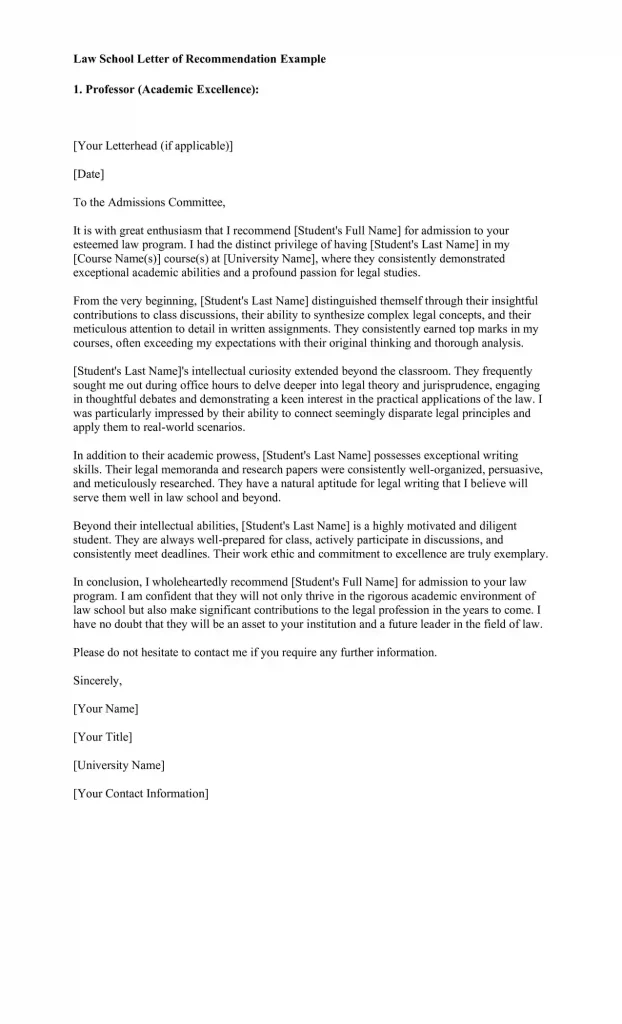
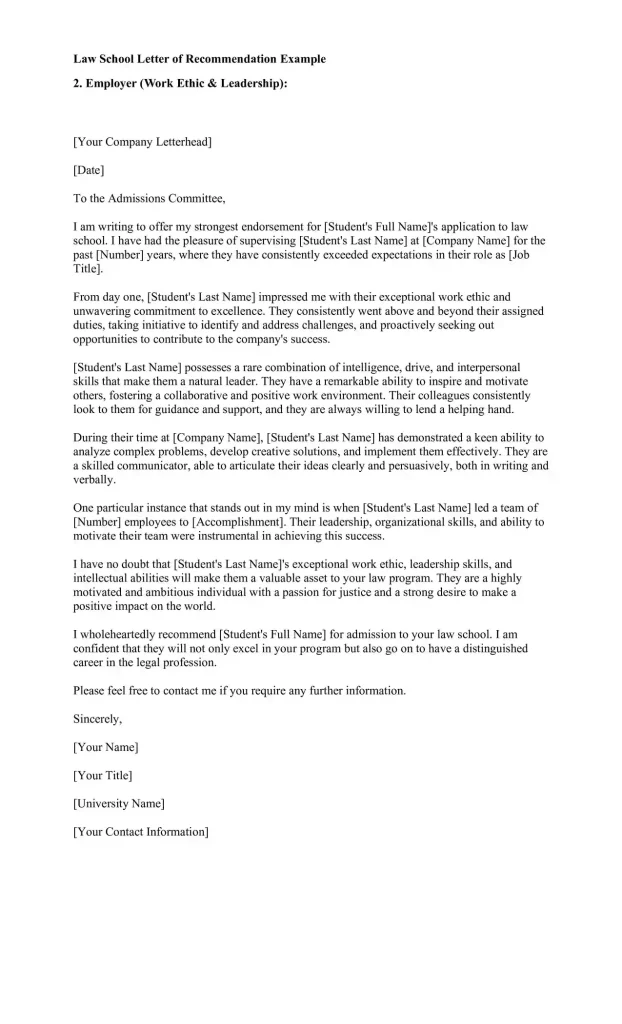
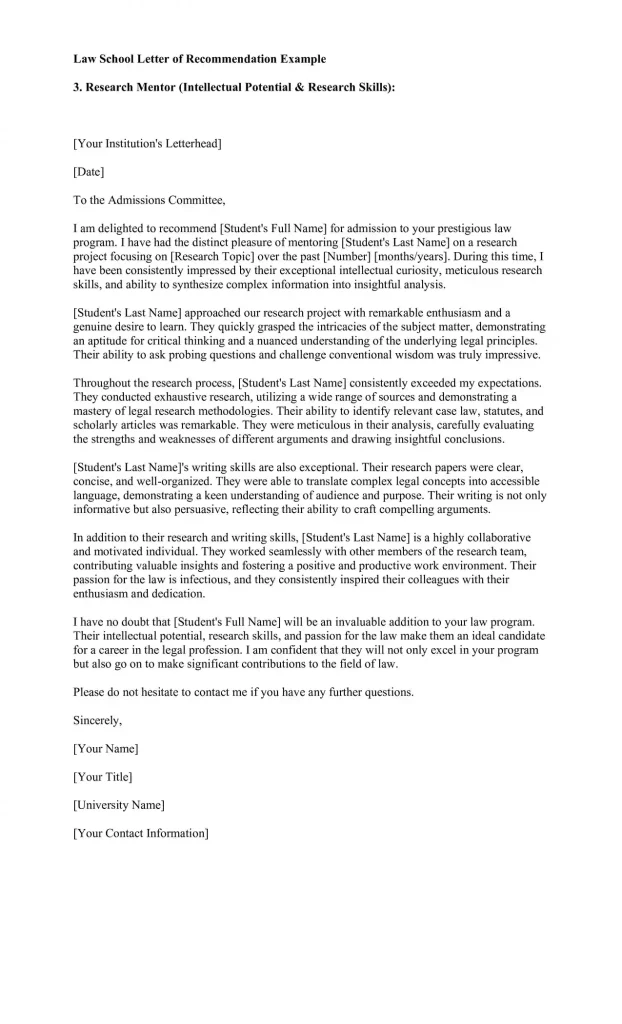
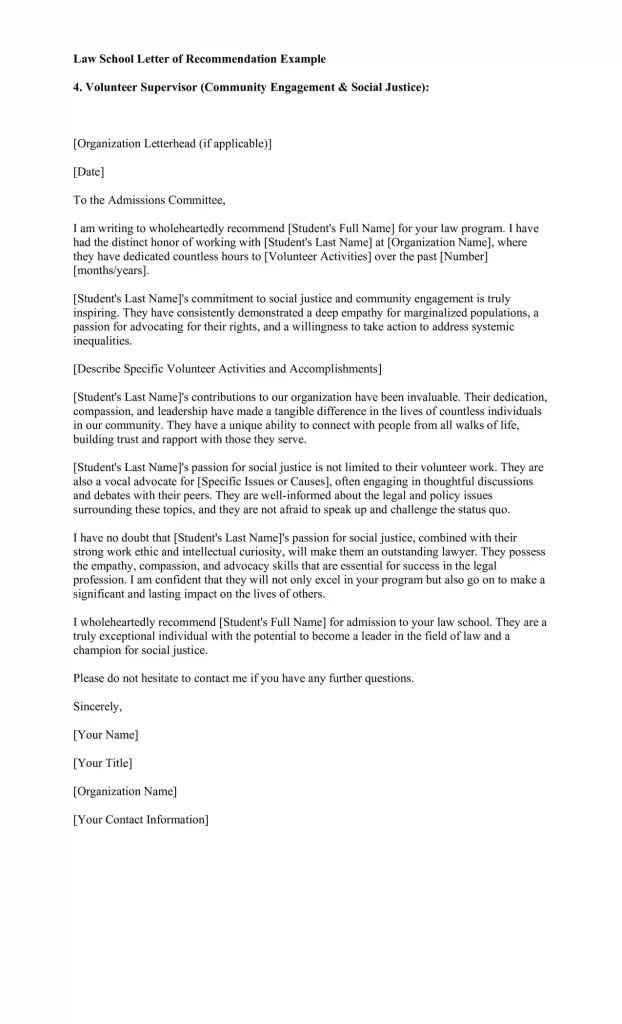
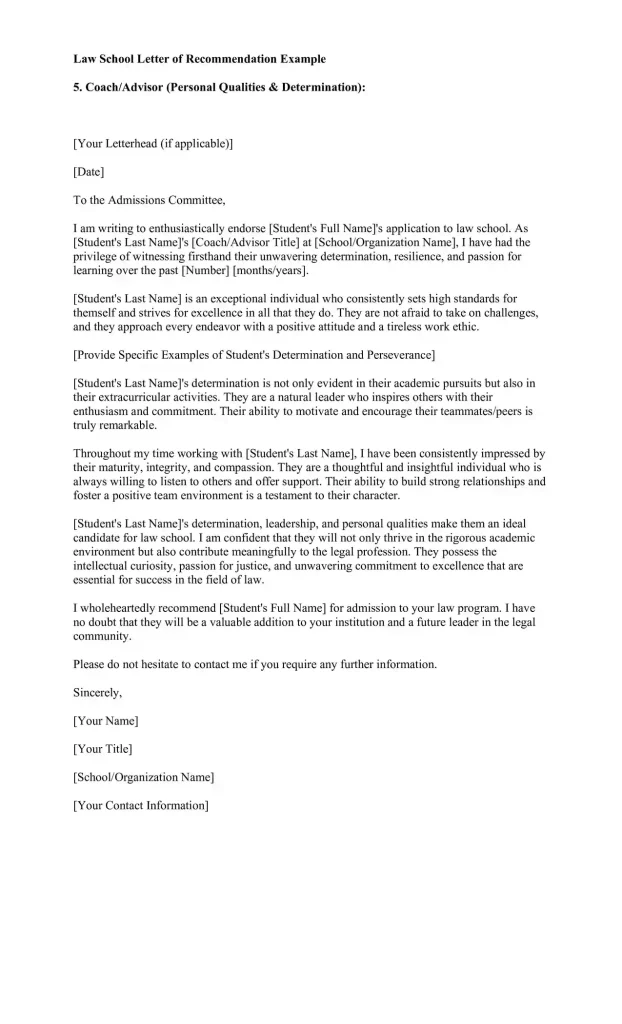
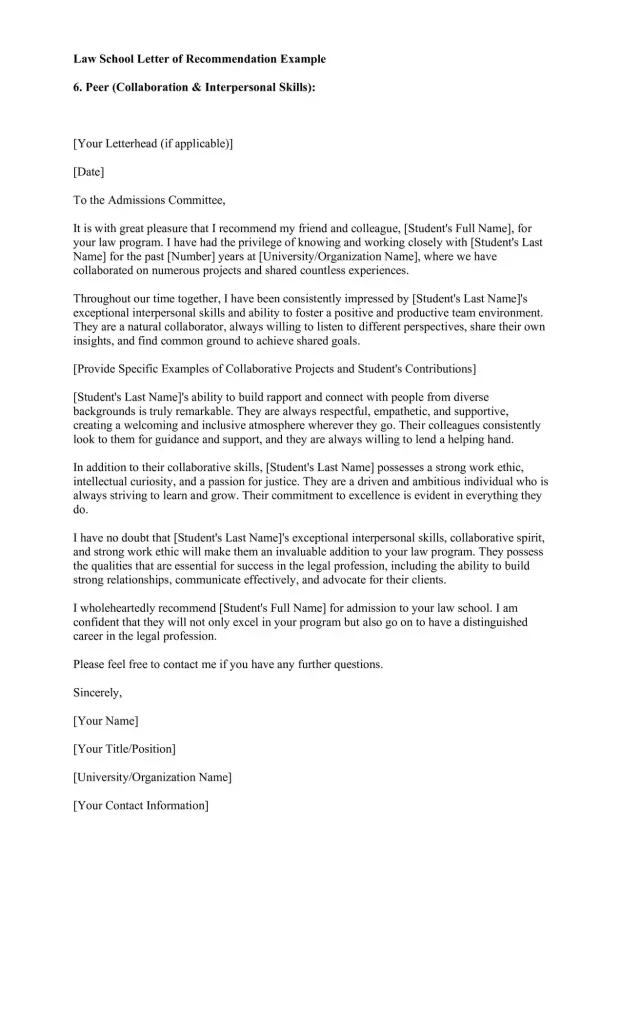
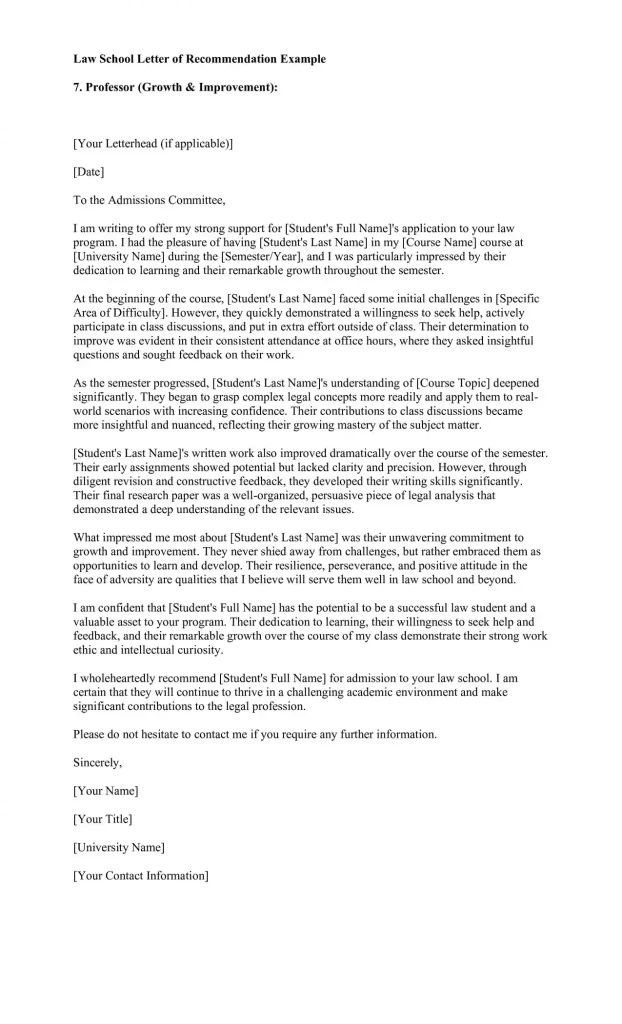
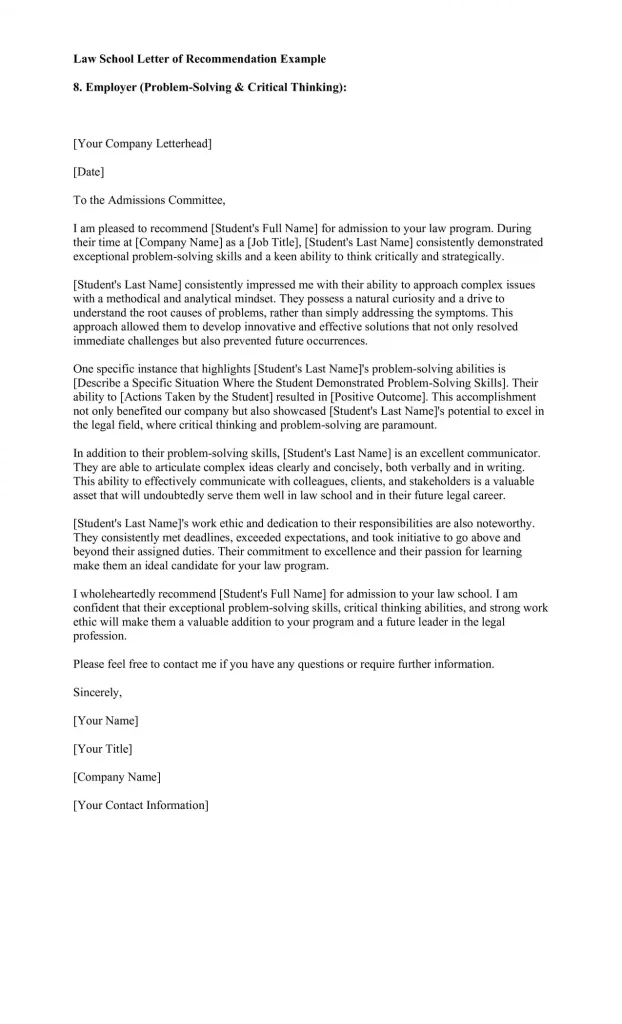
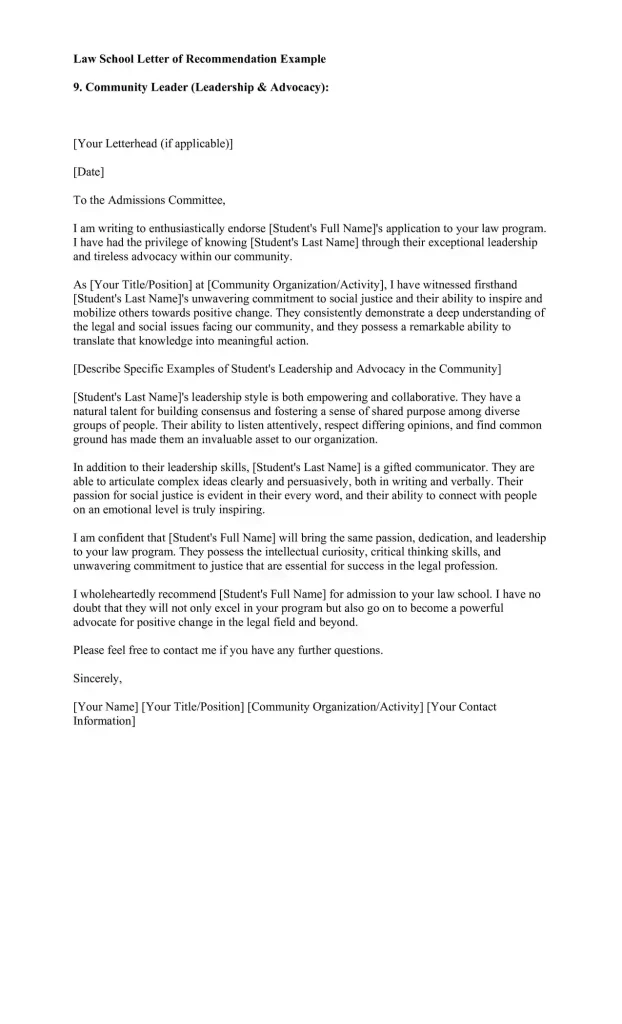
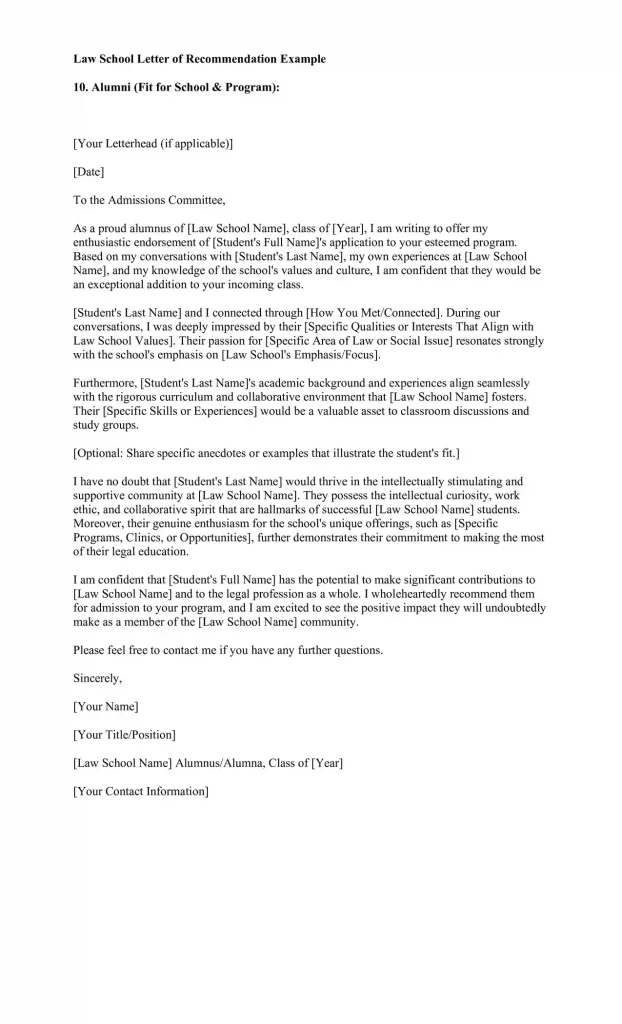
Handling Recommender Declines
What to Do If Your Recommender Says No
Sometimes, a potential recommender may decline your request. Here’s how to handle it:
- Stay Positive: Don’t take it personally. They might be too busy or not feel they know you well enough.
- Ask Someone Else: Have a backup list of potential recommenders.
- Express Gratitude: Thank them for considering your request and move on to another candidate.
Following Up on Your Request
Checking In
After you ask for a letter of recommendation, it’s important to follow up:
- Send a Reminder: A gentle reminder a week before the deadline can be helpful.
- Express Thanks: Always thank your recommender after they submit the letter.
The Impact
Long-Term Benefits
A strong letter of recommendation doesn’t just help with admission; it can also:
- Boost Confidence: Knowing that respected individuals believe in your potential can boost your confidence.
- Network Building: Maintain relationships with recommenders, as they can be valuable contacts in your future career.
Check out our sorority recommendation letter example if you need other recommendation letters.
FAQs About Law School Letters of Recommendation
How Should I Thank My Recommender?
Here’s how:
Send a Thank-You Note: Write a simple thank-you note or email. Express your gratitude for their time and effort.
Give an Update: Let them know if you get accepted to law school. They will be happy to hear about your success.
Offer Help: Ask if there’s anything you can do for them in the future.
Can I Submit Extra Letters If the School Requires Only Two?
Most schools have a set number of letters they want. Here’s what you should do:
Check the Guidelines: Always check the school’s rules. Some schools allow extra letters, but some do not.
Quality Over Quantity: It’s better to have two strong letters than many weak ones.
What Should I Do If a Recommender Misses the Deadline?
If your recommender misses the deadline, it can be stressful. Here’s how to handle it:
Send a Reminder: Politely remind them about the deadline a week before it’s due.
Have a Backup: Ask another person to write a letter as a backup.
Contact the School: Let the law school know if there’s a delay. Sometimes, they might give you a little extra time.
Can I See My Letters of Recommendation?
Sometimes you might wonder if you can see your letters. Here’s what you need to know:
Waive Your Right: Most schools ask you to waive your right to see the letters. This makes the letters more honest and trustworthy.
Trust Your Recommender: Choose someone you trust to write a good letter for you.
How Do I Choose the Best Recommender?
Choosing the right person to write your letter is important. Here’s how:
Know You Well: Pick someone who knows you well and can talk about your strengths.
Respected Person: Choose someone who is respected in their field, like a professor or employer.
Good Writer: Make sure they are good at writing and can express their thoughts clearly.
What Should I Include in My Request for a Letter of Recommendation?
When you ask someone to write a letter, give them all the information they need. Here’s what to include:
Your Resume: Provide your resume so they know about your achievements.
Deadline: Tell them when the letter is due.
Details: Explain what the law school is looking for and any points you want them to mention.
Can I Use the Same Letter for Multiple Schools?
You should use the same letter for different schools. Here’s what you need to do:
Generic Letter: Ask your recommender to write a generic letter that can be used for multiple schools.
Custom Details: Make sure there are no specific details that only apply to one school.
What if I Don’t Have Anyone to Write My Letter?
If you’re struggling to find someone to write your letter, here are some tips:
Reach Out: Contact former professors, employers, or mentors.
Explain Your Situation: Be honest about why you need the letter and ask for their help.
Build Relationships: Start building relationships with potential recommenders early so you have someone to ask when the time comes.
How Long Should I Give My Recommender to Write the Letter?
Give your recommender plenty of time to write a good letter. Here’s a good timeline:
One Month: Ask them at least one month before the deadline.
Reminders: Send gentle reminders as the deadline approaches.
A good law school letter of recommendation can make a big difference. Choose your recommenders carefully and ask them early. This will help you get the best letters to support your application.

Daniel Wilson Is a Seasoned communications professional and letter-writing expert. With over a decade of experience in corporate and non-profit sectors, Has developed a deep understanding of the power of effective communication.
Specializes in creating versatile letter templates that can be tailored to any situation. In this blog, Daniel shares a passion for the art of letter writing, offering practical tips, customizable templates, and inspiring ideas to help you communicate with clarity, confidence, and impact.






